Editor's Note: And now for something completely different, with a nod to Monty Python. There are parts of the story of China and the Jewish people that are not often spoken of, as well as parts of the story of China and Israel. This is part of that story. Enjoy your Thanksgiving holiday.
She came from the most important 20th century Chinese family. Her name means “Lucky Years” and she, her two sisters, and her brother played a remarkable role in China’s history. All of them were children of Han Jin Shun (known as Charlie Soong), a Chinese Methodist. He made sure all of them were American educated.
Soong Ai-ling, one of the three female children of Han, married China’s top banker, H.H. Kung.
Soong Mai-ling became the wife of China’s Chang Kai-shek. She would become prominent in China and Taiwan and highly influential in the United States.
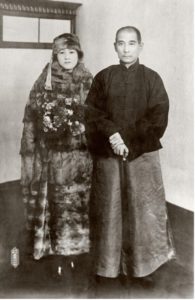
Soong Ching-ling would marry the founder of modern China Sun Yat-sen (1866–1925). After Sun’s death in 1925 she would remain prominent in Chinese politics, eventually siding with the communists. She was deeply revered in China, as is Sun Yat-sen to this day, and for a brief period (1976-1978) was the Acting President of the PRC, the first and only woman president of mainland China.
Soong Ching-ling (1893-1981) was a friend to Morris Abraham Cohen (Moishe), aka Two Gun Cohen (1887–1970). That friendship lasted from the 1930’s until Morris’s death in 1970.
Even in death that friendship continues. In the Blackley Jewish cemetery in Manchester, UK, there is a memorial stone on Morris’s grave. Soong Ching-ling placed a second marker next to his grave.
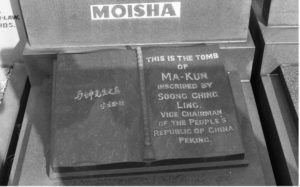
Morris is identified in four separate ways on the gravestone. First off, the gravestone lists his English name as General Morris Abraham Cohen. The Nationalist Chinese government awarded him the title of General. Cohen had served as a sergeant in the British army in World War I, although because of an unruly behavior incident, he was reduced in rank to Sapper (and the Army never reinstated his rank).
The second name is Morris’s Hebrew name, Moshe Avraham Ben Yosef Lev Ha Cohen.
His third name in English characters is his Chinese name, Ma-Kun (a Chinese rendering of Morris Cohen).
The additional marker at the foot of the grave marker reads: “Ma-Kun, Inscribed by Soong Ching Ling, Vice Chairman, People’s Republic of China.” Ling had it placed there at the time of the gravestone unveiling (typically around 11 months after the subject’s death). At the unveiling ceremony representatives of the People’s Republic of China and Taiwan (officially the Republic of China) attended.
Obviously, to garner a turnout that included diplomatic (and feuding) representatives honoring a man of notably humble origin, with a peculiar moniker, raises the question, “Who was Morris Cohen?” He was at the time and before, poorly regarded in the UK and Canada, yet he was also a hero in China and in Israel. How could that be?
Who Was Morris Cohen?
Cohen served time in jails in the UK, Ireland, Canada, and China (arrested by the Japanese). How could this man emerge as a key player, bringing arms to China to fight against Japan’s invasion army, and putting an end to support by the Chinese Communist government of Arab terrorists in Israel?
Morris had a limited education (although he could recite some Shakespeare) and his English was ungrammatical and accented. He never learned to speak Chinese although he spent years in China. He could speak Yiddish, the language of his family, and knew enough Hebrew (with some coaching) to recite Torah prayers as an adult, with his observant father present, bringing joy to the old man. Cohen looked after his family in the UK during his time in China and later, and, in his last years, down on his luck for a time, he would return to live with his family in Manchester until his death.
Mostly, Morris Cohen had instincts, some of which turned out to be of significant importance. Though born and raised in England, because of his errant behavior and trouble with the law, the Cohen family agreed to ship him to Canada in 1905 at the age of 16, where he was placed on a farm in Western Canada, and where he prospered for a time before he left farming for entrepreneurship, including gambling and various scams which he rather cheerfully embraced.
His political transformation started in Western Canada where he became a good friend of the Chinese community. He supported them during tough times, when the Canadian government wanted to send them all back to China or, if that was not possible, take away their political rights in the country.
Cohen defended them as well as he could, and learned what Sun Yat-sen, whom he met in 1908, was doing trying to bring China into the 20th century. Cohen began to promote Sun in Canada, traveling about speaking on behalf of Sun and his vision for China, and raising money for the cause. The Chinese community inducted him as one of the few non-Chinese into the Tongmenghui (Sun Yat-sen’s anti-Manchu underground organization) and which later became the Kuomintang (KMT). Later, he was a firearms instructor for the local chapter.
Off to China
After yet another stint in jail in Canada for running a gambling operation, and with few if any prospects in Canada, Morris Cohen took himself to China and offered his full-time services to Sun Yat-sen as a bodyguard. It was in his first interview with Sun that Madame Sun made an appearance. Morris was smitten. Over the years he would work first for her husband, later (for a time for Chiang), and for Madame Sun.
Impressed by Cohen’s ideas, especially about training young Chinese in basic fighting, Sun Yat-sen asked Cohen to be his bodyguard while he traveled in Canada and the US in 1910. As he headed back to China, Sun asked Cohen to purchase arms and ammunition to ship to China and gave him permission to establish a Chinese cadet corps in Canada. Due to his closeness to Sun and his bona fides with the Canadian Chinese community, Cohen recruited and established a training unit of 450 young Chinese in Edmonton, Canada.
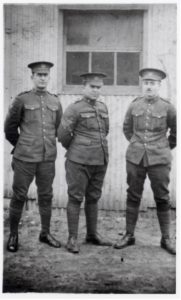
During WWI, Cohen served with the Canadian Railway Troops in Europe where he supervised Chinese laborers, continuing his connection with Chinese.
Cohen’s career (1922-1943) and why is he a hero in China
As the Manchu Qing dynasty fell apart in 1911, after having controlled China since 1644, Sun Yat-sen emerged as the national leader that united all new parties. As can be seen in the many photographs taken at the time, amid the turmoil, one person who was not Chinese stood next to him.
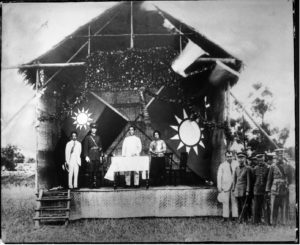
From the Collection of Josef L. Rich
Not only was Morris Cohen not Chinese, but he also had a unique background of being a Jew born in Poland (an area then part of Russia), a Brit, a Canadian, a WWI veteran, and a burly man – and he was in a unique time in China.
Two-Gun Cohen Nickname
In his early days in China as a bodyguard, during an attempted assassination of Sun Yat-sen, the assassin lightly wounded Cohen in his left arm while protecting Sun. Realizing that the assassin could have injured his right arm where he had his one gun, he decided that he should train himself to be able to draw and shoot with either hand while carrying two guns. This way he could draw a weapon from either side reducing his reaction time in case of injury.
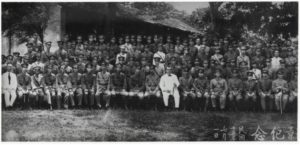
From the Collection of Josef L. Rich OBE
Imperial Japanese invasion of China and WWII
Chiang Kei-Shek appointed Cohen as the de facto Minister of War from 1926-28. Cohen participated in fighting against Communist and Japanese Imperial forces as well as covert missions to purchase weapons wherever he could find them around the world, much like the Jewish underground did prior to the establishment of the State of Israel.
In 1941, he was in Hong Kong while protecting Soong Ching-ling and her sister Soong Ai-ling as the Japanese took control of the enclave. He was able to help them escape by booking them on one of the last planes out of the British colony but chose to stay behind. The Japanese later captured him, and imprisoned him for two years, treating him badly. The Japanese released him in 1943 as part of a rare prisoner exchange and returned to Canada.
Respected by both the PRC and the ROC
After the end of the Chinese civil war, he was one of the few foreigners able to visit the PRC and the ROC with ease due to his association with Sun Yat-sen and his efforts during the war against the Japanese imperial forces, as well as his association with Soong Ching-ling, and Chiang Kei-Shek. He tried to reconcile the two sides of the civil war to no avail.
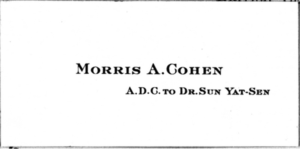
Cohen was the only westerner invited to the funeral of Sun Yat-sen in 1925. In 1966, Cohen was the only westerner on the podium in Beijing together with Mao Zedong and Zhou Enlai for the 100th Anniversary celebration of Sun Yat-sen’s birth. The ROC paid him a pension until his death as he had been a general in the Nationalist forces.
He ended up moving back to Manchester, England and he died in 1970.
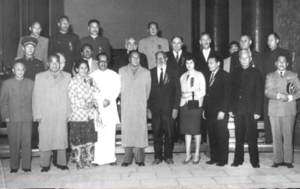
Collection of Victor D. Cooper
Why is Cohen a hero for Israel?
In some respects, Morris Cohen is much like the foreign heroes of Israel’s War of Independence such as General Mickey Marcus (American Jew), General Orde Wingate (British Christian Zionist), and many other foreign volunteers who helped establish the State of Israel.
During the 1947 UN Partition Plan, the five members of the UN Security Council (UNSC) needed to vote. If one of them voted no, then the plan would have denied Israel a state. At the time, Chiang Kai-Shek’s UN delegation in San Francisco represented the China seat since the PRC was not a member of the UN. Therefore, the Israeli delegation needed to get the ROC’s vote.
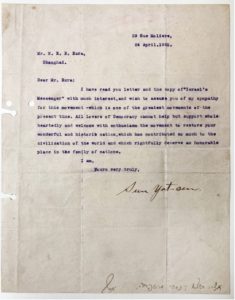
In Arieh Marinsky’s book, “Baor uvaSeter (באור ובסתר) [In Light and in Secret] (Tel Aviv: Edanim, Yediot Aharonot, 1992), Soong Qing-ling is reported to have said the following in support of Zionism just prior to the British withdrawal from Palestine–perhaps influenced by Morris Cohen: “The revolution you are making is blessed and the Zionists’ struggle against the British would create a chain reaction against British imperialism all over the world.”
According to Professor Itzhak Shichor who authored an article on Betar in China (Zionist youth movement), he noted that Morris Cohen provided weapons to Betar (explosives and machine guns) as well as maps and plans on British military sites and naval ships in Shanghai and Canton in case the British failed to depart Palestine in 1948. Luckily, the British left as planned and Cohen – who was a British citizen – might have had some explaining to do if the British had caught him.
Another Israeli story
Palestinian terrorists were placing small mines near schools in Northern Israel in the late 1960s. Israeli children were severely injured when they accidently picked them up. China had produced these mines and supplied them to the terrorists. Morris visited Israel in 1969 and after meeting with senior Israeli officials about the mines, he met with his old friend PRC Premier Zhou Enlai in Geneva and convinced him to stop supplying these mines to the Palestinians.
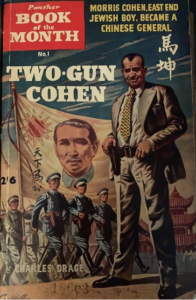
After the meeting, the mines disappeared.
An Unknown Hero?
Morris Cohen was another hero who had influence on the history of China by helping the Nationalist forces establish their military, by saving the life of Sun Yat-sen as his bodyguard, the successful interlocutor for Sun to English speaking countries, and helping Israel.
Biographies of Cohen take two different approaches, either romanticizing Cohen’s life beyond recognition (including Morris Cohen’s own autobiography) or criticizing him as uneducated and his history overblown. Neither approach does justice to Cohen’s achievements.
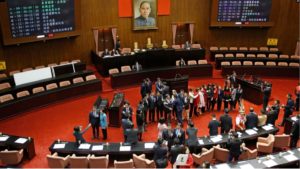
Just as both the Chinese Communists called Sun Yat-sen the “Forerunner of the Revolution” and the Taiwanese Nationalists called him the “Father of the Nation”, Cohen played a unique role in both countries supporting Yat-sen and Chiang.
But Cohen’s devotion to Soon Ching-ling is also a love story. Morris Cohen revered Ching-ling and her late husband. He embraced their desire to create a modern China and to throw off foreign domination, the same urge that led him to support Israel as it reemerged after 2,000 years.
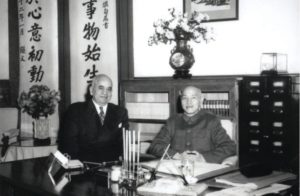
Collection of Victor D. Cooper
Guermantes Lailari is a Member of the JPC Board of Fellows and a Taiwan Fellow. Stephen Bryen is a Senior Fellow at the Center for Security Policy and the Yorktown Institute





